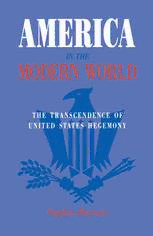
America in the Modern World: The Transcendence of United States Hegemony PDF
Preview America in the Modern World: The Transcendence of United States Hegemony
AMERICA IN THE MODERN WORLD AMERICA IN THE MODERN WORLD THE TRANSCENDENCE OF UNITED ST A TES HEGEMONY STEPHEN BURMAN University 01 Sussex Palgrave Macmillan © 1991 Stephen Burman Softcover reprint ofthe hardcover 1st edition 1991 978-0-312-01971-6 All rights reserved. For information, write: Scholarly and Reference Division, St. Martin's Press, Ine., 175 Fifth Avenue, New York, NY 10010 First published in the United States of America in 1991 ISBN 978-1-349-60470-8 ISBN 978-1-349-60468-5 (eBook) DOII0.1007/978-1-349-60468-5 Library of Congress Cataloging-in-Publication Data Burman, Stephen. America in the modem world: the transcendence of United States hegemony / Stephen Burman. p. cm. Includes bibliographical references and index. 1. Uni ted States-Foreign relations-1945-1989. 2. United States Foreign relations-1989-- I. Tide. E840.B88 1991 91-26387 327. 73----de20 CIP For Candida and Eve CONTENTS Priface IX CHAPTER ONE Theories of imperialism 1 CHAPTER TWO Imperialism and the Uni ted States 24 CHAPTER THREE The superpowers: politics, economics and survival 46 CHAPTER FOUR The capitalist powers: discord and harmony 67 CHAPTER FIVE America and the Third W orId 89 CHAPTER SIX The 1960s: the acme of American power 111 CHAPTER SEVEN Nixon and Carter: responses to decline 131 CHAPTER EIGHT Reagan and the resurgence of America in the 1980s 153 CHAPTER NINE America in the 1990s: dangers and opportunities 175 Se/ect Bibliography 197 Index 211 PREFACE In the past few years we have witnessed ehanges whieh will prove to be of lasting signifieanee in international affairs. The revolutions in Eastern Europe and the Soviet Union, for example, are fundamental not only for those soeieties but also in their implieations for the rest of the world. They signal nothing less than the end of the international order that has governed the post-war era. Sinee the United States was the principal arehiteet of that order, its passing will have fundamental implieations for Ameriea's role in the modern world. It has been widcly suggested that this transformation will reduee the USA to the status of an ordinary eountry, indeed that the signs of decline are already everywhere apparent. And yet the euphoria surrounding Ameriean-inspired and lcd vietory in the Gulf war has, paradoxieally, given rise to visions, or nightmares, of aresurgent, militaristie Ameriea dominating the new world order to an extent that will make its hegemonie role in the post-1945 era look pale by eomparison. In this book I rejeet both extremes, but argue that the 1990s do offer great opportunities for the USA to retain its status as the leading power in the world. There are many dangers to the Ameriean position in a transition of this magnitude, notably the weaknesses of its domestie eeonomy, but the fundamental trends of the eollapse of eommunism and the globalization of the market eeonomy favour eontinuing Ameriean influenee. World polities will beeome more eomplcx as it moves away from a system dominated by the bipolarity of superpower eonfrontation and towards aglobai market system. Collaboration rather than domination will have to beeome the mode of operation in inter national affairs, and no single eountry will enjoy the unquestioned pre eminenee that the USA aehieved after the Seeond World War. But the inereasing interdependenee attendant on the globalization of eapitalism will not obviate the need for politieal leadership if it is to produee a stable and prosperous order rather than deseend into destruetive lX
